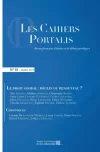Un nouvel article écrit par Charly Derave, Nathan Genicot et Nina Hetmanska, est paru dans la revue European Journal of Risk Regulation.
Depuis plusieurs années, l’Union européenne promeut une approche visant à rendre l’intelligence artificielle et ses usages dignes de confiance. La proposition de règlement publiée par la Commission en avril 2021 constitue l’étape la plus récente en la matière. Cet article entend mettre cette approche à l’épreuve en examinant la façon dont l’Union européenne applique elle-même ces valeurs sur le terrain lorsqu’elle a recours à des dispositifs technologiques pour réaliser ses propres politiques. En ce sens, il prend pour cas d’étude le European Travel Information and Authorisation System (ETIAS), un système d’information à grande échelle qui délivrera une autorisation de voyage aux ressortissants de pays tiers exemptés de l’obligation de visa au moyen notamment d’un algorithme de profilage. L’article montre, d’une part, qu’ETIAS constitue une pièce supplémentaire de l’infrastructure de surveillance numérique des ressortissants de pays tiers que l’UE a bâti depuis des années. D’autre part, le processus algorithmique d’ETIAS s’avère être un instrument d’exclusion différenciée qui est susceptible de produire des effets préjudiciables sur certains groupes de voyageurs non-européens. En guise de conclusion, cet article soutient que loin d’être étranger à l’approche défendue par l’UE en matière d’intelligence artificielle, ETIAS en est un élément constitutif.
Cette recherche est le fruit d’une étroite collaboration entre trois doctorant·e·s du Centre Perelman. Elle a été initiée et portée par Nina Hetmanska qui était activement engagée dans la lutte pour les droits des personnes migrantes. Nina est décédée tragiquement en mars dernier. La parution de cet article constitue un hommage au travail qu’elle menait depuis des années auprès des populations marginalisées. Puissent son combat et sa détermination toutes et tous nous inspirer.
Retrouvez l’article ici : https://www.cambridge.org/core/journals/european-journal-of-risk-regulation/article/risks-of-trustworthy-artificial-intelligence-the-case-of-the-european-travel-information-and-authorisation-system/FE811AAE3C15442F0707209DBF551B00
* * *
A new article written by Charly Derave, Nathan Genicot and Nina Hetmanska, has been published in the European Journal of Risk Regulation.
In recent years, the European Union has strongly promoted a human-centric and trustworthy approach to artificial intelligence. The 2021 proposal for a Regulation on AI that the EU seeks to establish as a global standard is the latest step in the matter.However, little attention has been paid to the EU’s use of AI to pursue its own purposes, despite its wide use of digital technologies, notably in the field of border management. Yet, such attention allows us to confront the highly moral discourse that characterises EU institutions’ communications and legislative acts with a concrete example of how the promoted values are realised “on the ground”. From this perspective, this paper takes the case study of the European Travel Information and Authorisation System (ETIAS), an EU information technology system (planned to become operational in May 2023) that will provide travel authorisation to visa-exempt third-country nationals using a profiling algorithm. The paper shows, on the one hand, that ETIAS constitutes another piece in the massive infrastructure of digital surveillance of third-country nationals that the EU has been building for years. On the other hand, ETIAS’s algorithmic process is shown to be an instrument of differential exclusion that could well have an adverse impact on certain groups of foreign travellers. Ultimately, this paper argues that far from falling outside the scope of the trustworthy approach to AI championed by the EU, ETIAS – and more broadly the systematic risk evaluation predominant in the EU’s use of AI – is a constitutive part of it.
This research is the result of a close collaboration between three PhD students of the Perelman Centre. It was initiated and carried out by Nina Hetmanska, who was actively involved in the fight for the rights of migrants. Nina tragically passed away last March. The publication of this article is a tribute to the work she had been doing for years to defend marginalised populations. May her struggle and determination inspire us all.







